
Because Israel has been privileged with being God’s chosen people, they are placed squarely in the center of history and prophecy.
Israel is no larger than the state of New Jersey, and the Jewish people comprise about a quarter of one percent of the world’s population. How is it then that they play such an important role in world events with global coverage of its daily activities? We must turn to the Scriptures to understand what is happening in the world today and what will take place in the future. The best place to start is by looking at the past—when God first called Israel to be His chosen People.
A Brief History of Israel
In the Old Testament
Israel’s history began more than 3,500 years ago when, according to the early chapters of Genesis, Abraham received a divine call to leave his ancient land of Ur and go to a land which God would show him. After some delay, Abraham finally entered the land, and there Isaac, the son God had promised him, was born.
Even after God had fulfilled His promise to Abraham regarding Isaac, Abraham himself never possessed the Promised Land but lived as a foreigner in the Promised Land. The author of Hebrews writes,
By faith Abraham, when he was called, obeyed and set out for a place that he was going to receive as an inheritance. He went out, even though he did not know where he was going. By faith he stayed as a foreigner in the land of promise, living in tents as did Isaac and Jacob, coheirs of the same promise. For he was looking forward to the city that has foundations, whose architect and builder is God (Hebrews 11:8-10).
Though Abraham was blessed with much wealth, He never fulfilled his hope of a homeland; this was true of his son Isaac as well. At the invitation of Joseph, Jacob and the people of Israel relocated to Egypt, where they lived for hundreds of years. After intense suffering and severe persecution, their very existence being threatened by Pharaoh, the Jews departed Egypt and began their journey to the Promised Land with Moses as their divinely appointed leader. After forty years in the wilderness, their pilgrimage from Egypt to the land God had promised Abraham was completed.
The conquering of Palestine and partial occupation were recorded by Joshua. For generations after their arrival to the Promised Land, Israel experienced much oppression and moral deterioration. They experienced periodic oppression by Gentile nations with occasional periods of spiritual and political recovery led by judges God had raised up. As you read through Judges, you learn that Israel was characterized by political anarchy during that period of their history. The period of the judges was followed by the reign of kings, with Saul as Israel’s first king. Under the reign of David and his son Solomon, Israel experienced political power, with Israel reaching its highest point in terms of wealth, glory, and prestige. It was during Solomon’s reign that much of the Promised Land came under his sway, though not possessed. About this, Charles Ryrie writes,
“Amillennialists contend that the land was fully possessed by Israel during the time of Solomon. Their proof text is 1 Kings 4:21 which says: And Solomon reigned over all kingdoms from the river unto the land of the Philistines, and unto the border of Egypt: they brought presents, and served Solomon all the days of his life. In the very fact of using this text the amillennialist is admitting that the covenant was literally fulfilled. Why, then, does he look for a spiritual fulfillment by the Church? However, we can point out four things that were not fulfilled by Solomon. There was no permanent possession of the land as promised to Abraham. All the land was not possessed. “From the River of Egypt” (Gen. 15:18) and “unto the border of Egypt” (1 Kings 4:21) are not equivalent terms geographically. Solomon did not occupy all this land; he merely collected tribute. Temporary overlordship is not everlasting possession. Finally, hundreds of years after Solomon’s time the Scripture still abound in promises concerning future possession of the land. This must prove that God and his prophets realized, whether the amillennialist does or not, that Solomon had not fulfilled the Abraham covenant.”1
Moral decay was again at the heart of Israel’s decline. In his disregard to God’s law regarding marriage to pagans, Solomon ended up marrying women who did not share his faith, which resulted in idol worship by the children who were raised by his pagan wives. That led to God’s judgment, which led to the divided kingdoms of Israel and Judah. The northern Kingdom of Israel was composed of ten of the twelve tribes of Israel who persisted in apostacy with the worship of idols as its national religion. The Assyrians took the ten tribes captive in 721 B.C. The southern Kingdom of Judah was composed of the other two tribes of Israel. Judah was taken captive by Babylonia about a hundred years later.
Jeremiah 29:10 says,
For this is what the Lord says: “When seventy years for Babylon are complete, I will attend to you and will confirm my promise concerning you to restore you to this place.
At the conclusion of the seventy years, Israel started making their way back to their homeland with Zerubbabel as the leader of the first expedition. Ezra records the start of the restoration of the land and construction of the temple. We see the complete picture with Nehemiah’s rebuilding of the walls and the restoration of Jerusalem. Israel, as a nation, was once again in the land that God had promised Abraham.
Between the time of restoration and the time of Christ, the nation of Israel faced several serious challenges. Alexander the Great swept over Palestine, then they were subjected to the Seleucian rulers, and later came under the control of the Syrians. The Maccabean revolt in 167 B.C. led to severe persecution for the people of Israel. Then they came under the control of the Romans when Pompey established control in 63 B.C.; they remained under Roman control for centuries. It was during this time that Christ was born in Bethlehem and based on Roman authority, was later crucified.
Since Christ
In A.D. 70, the Roman general Titus ordered Jerusalem and its temple destroyed, which led to the death of over 250,000 Jews. The Jews who remained continued to revolt which led to the order of the desolation of Judea in A.D. 135. Fortresses were demolished and nearly a thousand towns and villages were left in ashes. Except for only very few who remained, the Jews were scattered to the four winds.
From A.D. 135 through current times, the Jewish people made their homes all over the world. The land was taken over by the Abbasid Arabs in the 8th century. For a short period, the Frankish crusaders were established in Palestine only to be defeated by Saladin in 1187. The Ottoman Turks assumed power of the land of Palestine in 1517 with the land remaining as part of the Ottoman Empire until Turkey was defeated in World War I. Palestine was then conquered by General Allenby in 1917. The occupation of Palestine by the British proved to be a dramatic turning point Israel’s history.
Israel’s Return
S. Maxwell Coder reminds us that,
“For eighteen centuries, from A.D. 70 to about 1850, it seemed impossible that the scattered people of Israel could ever become a nation again. In the nineteenth century, nationalism became a mighty force in the world. More than ever, the Jews were not allowed to feel at home in the nations in which they lived. They were regarded as intruders in many countries. They also began to see that the spiritual heritage was endangered by the pressure of the non-Jewish environment.”2
Chafer explains that,
“In no case would Israel’s national entity be lost even through centuries of dispersion (Jeremiah 31:36; Matthew 24:34). They refused the divine offer and provision for their regathering and kingdom glory which was made by their Messiah at His first advent (Matthew 23:37-39), and, as at Kadesh-barnea where their wilderness experience was extended (Numbers 14:1-45), their chastisement was continued, and will be continued until He comes again. At that time He will regather His people into their own land and cause them to enter into the glory and blessedness of every covenant promise of Jehovah concerning them (Deuteronomy 30:1-10; Isaiah 11:11, 12; Jeremiah 23:3-8; Ezekiel 37:21-25; Matthew 24:31).”3
The Zionist movement had already begun prior to World War I. Re-establishment efforts were already in the works as early as 1871. In 1881 the modern Zionist resettlement began in earnest, at that time there were about 25,000 Jews living in that entire area. The Zionist idea as stated in “The Basle Programme” was adopted by the first Zionist Congress called by Theodor Herzl in 1897. It sought to reclaim the land of Palestine for the Jewish people. By the start of World War 1, the number of Jews had grown to 80,000.
The Zionist movement gained momentum during World War I when British Foreign Secretary Arthur J. Balfour instituted the Balfour Declaration on November 2, 1917, in which he stated: “His Majesty’s Government views with favor the establishment in Palestine of a national home for the Jewish people…” This declaration was well received by the Jews but not by the Arabs in the region, which resulted in not much coming from it.
In 1939, towards the beginning of World War II, the British government issued the conditions for establishing an independent Arab state in Palestine. By that time, almost half a million Jews were in the country. Jewish immigration was restricted and only with Arab consent could further immigration continue.
During World War II, resulting from the deaths of over 6 million Jews at the hands of the Nazis, sympathy for the Jews grew worldwide and the feeling became widespread that Israel should have a homeland to which its refugees could come and establish themselves. In 1945 the Arab League was formed for the express purpose of opposing any further Jewish expansion. After World War II, Palestine was turned over to the United Nations by the British government and under the direction of this organization, a partition of was recommended, Palestine would be divided, being home to a Jewish state and an Arab state. By 1948 there were already 650,000 Jews living there.
Israel Established
Israel proclaimed itself an independent state within the boundaries set up by the United Nations when the British withdrew control on May 14, 1948. Before the day was even over, six nations, Egypt, Jordan, Iraq, Syria, Lebanon, and Saudi Arabia, attacked Israel and war had broken out. A series of truces began; the first was on June 11, 1948 which was followed by a renewal of hostilities which ended in the final truce on July 17, 1948. Although Israel had just established itself, not only were they victorious, but in the process, they expanded their boundaries and gained territory. On January 7, 1949, a general armistice was arranged in which Israel could retain the additional land they had secured during the war. Israel itself was admitted to the United Nations. In the years that followed no adequate solution was found in attempts towards permanent peace. The Arab nations refused to recognize Israel and denied it the right of existence.
Since then, Israel has made incredible progress. Even though it is surrounded by enemies, Israel rests in its security of superior weaponry and an effective military apparatus. Of great importance is the absolute fact that for the first time since A.D. 70, Israel has been recognized as a political state and is independent, self-ruled, and self-sustaining.
There is no question that the restoration of the Jewish people to its ancient land and its establishment as a political government is almost without parallel in the history of the world. Never have an ancient people, scattered for so long, been able to return to their ancient land and re-establish themselves with such success and such progress as witnessed in the new state of Israel.
The Prophetic Significance of the Re-established State
The prophetic significance of the re-established State is without question bound up with the increased importance of the Middle East in global affairs. Palestine, Israel’s homeland is in the hub of three major continents, a strategic location heavily involved in the economic life of the world. Any country desiring to dominate the world will need to conquer the land of Palestine for a number of reasons: first, the Middle East is a channel of world commerce; second, it possesses immense reserves of oil which are quite substantial. As current world events testify to, the Middle East will inevitably be engulfed in any future world conflict. From a biblical standpoint, the Middle East remains a center of significant interest; it is and will continue to be the world stage according to Bible prophecy.
Mark Hitchcock writes and states,
“The most prophesied event in end time passages in the Bible is the return of the Jewish people to their promised land. The Bible predicts over and over again that the Jews must be back in their homeland for the events of the end times to unfold (see Jeremiah 30:1-3; Ezekiel 34:11-2424; Zechariah 10:6-10). Simply stated, almost all the key events of the end times hinge in one way or another on the existence of the nation of Israel. Israel is the battleground for all the great end time conflicts and wars described in the Bible.”4
As previously mentioned, in A.D. 70 the land of Israel, along with the Jewish temple, was destroyed by the Roman army. Since then, the Jews have been scattered all over the world. In Deuteronomy 22:64-66, this worldwide scattering of the Jewish people was prophesied and, as well, has been literally fulfilled.
Then the Lord will scatter you among all peoples from one end of the earth to the other, and there you will worship other gods, of wood and stone, which neither you nor your ancestors have known. You will find no peace among those nations, and there will be no resting place for the sole of your foot. There the Lord will give you a trembling heart, failing eyes, and a despondent spirit. Your life will hang in doubt before you. You will be in dread night and day, never certain of survival.
In the teaching of Ezekiel 37:1-14, the Valley of the dry bones, Ezekiel gives is a beautiful picture of the national return, restoration, and regeneration of the whole house of Israel.
The hand of the Lord was on me, and he brought me out by his Spirit and set me down in the middle of the valley; it was full of bones. He led me all around them. There were a great many of them on the surface of the valley, and they were very dry. Then he said to me, “Son of man, can these bones live?”
I replied, “Lord God, only you know.”
He said to me, “Prophesy concerning these bones and say to them: Dry bones, hear the word of the Lord! This is what the Lord God says to these bones: I will cause breath to enter you, and you will live. I will put tendons on you, make flesh grow on you, and cover you with skin. I will put breath in you so that you come to life. Then you will know that I am the Lord.”
So I prophesied as I had been commanded. While I was prophesying, there was a noise, a rattling sound, and the bones came together, bone to bone. As I looked, tendons appeared on them, flesh grew, and skin covered them, but there was no breath in them. He said to me, “Prophesy to the breath, prophesy, son of man. Say to it: This is what the Lord God says: Breath, come from the four winds and breathe into these slain so that they may live!” So I prophesied as he commanded me; the breath entered them, and they came to life and stood on their feet, a vast army.
Then he said to me, “Son of man, these bones are the whole house of Israel. Look how they say, ‘Our bones are dried up, and our hope has perished; we are cut off.’ Therefore, prophesy and say to them, ‘This is what the Lord God says: I am going to open your graves and bring you up from them, my people, and lead you into the land of Israel. You will know that I am the Lord, my people, when I open your graves and bring you up from them. I will put my Spirit in you, and you will live, and I will settle you in your own land. Then you will know that I am the Lord. I have spoken, and I will do it. This is the declaration of the Lord.’”
Once again, I quote Mark Hitchcock,
“Israel is first restored physically. The physical restoration is pictured by the coming together of bones, sinew, and skin. An army of skeletons comes together bone by bone, then each one is covered by tendons, flesh, and skin to become a complete body. Piece by piece. But the Army is still made up of lifeless corpses (see 37:8). Then Ezekiel witnesses Israel’s spiritual regeneration when the breath of the spirit breathes life into the detonation (see 37:9). Of course the spiritual regeneration won’t occur up to the Messiah returns.”5
Today, over 30% of the approximately 14,000,000 Jews in the world are back in Israel. That percentage is expected to double by 2030.
Before many of the end times events can take place, Israel must be back in the land. Now that the Jewish state has been re-established and Jews are back in the land, prophecies such as Daniel 9:27 can be fulfilled. In this prophecy, the antichrist makes a covenant with Israel for the rebuilding of the Jewish temple, which must be in existence during the seven-year tribulation period spoken of in Matthew 24:15-21. Scripture tells us that during that 70th week of prophecy, the antichrist will break his covenant with Israel and will begin to persecute the Jews. This will set the scene for the spiritual restoration of Israel. None of this could take place without the re-establishment of the Jewish state. In fact, the seven-year tribulation cannot start until Israel is back in the land and can make peace with the antichrist. With the re-establishment of the Jewish state, the stage is set.
1 Charles C. Ryrie, The Basis of the Premillennial Faith, Op. cit., p. 53.
2 S. Maxwell Coder, Israel’s Destiny (Chicago, IL: Moody Press, 1978), p. 53.
3 Lewis Sperry Chafer, Major Bible Themes (revised edition) (Grand Rapids, MI: Zondervan Publishing House, 1974), pp. 307-308.
4 Mark M. Hitchcock, Seven Signs of the End Times (Sisters, OR: Multnomah Publishers, 2002), pp. 13-14.
5 Ibid., p. 18.
Copyright © 2006–2021 by Miguel J. Gonzalez Th.D.
Dr. Miguel J. Gonzalez is the Founder and President of Reasons for Faith International Ministries. He served as a pastor for ten years in Charlotte, NC and has taught in churches and conferences throughout the United States. He currently hosts the Time in the Word and Truth To Live By podcasts and writes at KnowingChristianity.blogspot.com.
Unless otherwise noted, all Scripture is taken from The Christian Standard Bible. Copyright © 2017 by Holman Bible Publishers. Used by permission. Christian Standard Bible®, and CSB® are federally registered trademarks of Holman Bible Publishers, all rights reserved.



